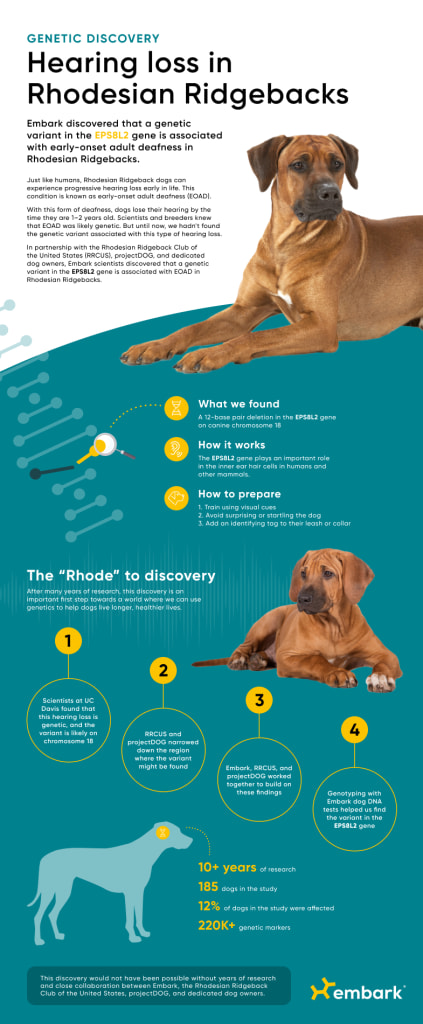Hearing loss is one of the most common disabilities in humans and dogs. Just like humans, Rhodesian Ridgeback dogs can experience progressive hearing loss early in life. This condition is known as early-onset adult deafness (EOAD).
With this form of deafness, dogs lose their hearing by the time they are 1–2 years old. Some purebred Rhodesian Ridgebacks lose their hearing as early as 4 months of age. Breeders and dog owners have noticed that this condition can affect male dogs earlier in life than female dogs.
Scientists and breeders knew that EOAD likely had a genetic component. But until now, we had not found the genetic variant associated with this type of hearing loss.
The Embark team set out to investigate the genetic basis of this condition.
The genetics of hearing loss
Embark scientists discovered that a variant in the EPS8L2 gene is associated with EOAD in Rhodesian Ridgebacks. This variant, specifically a 12-base pair deletion, is on canine chromosome 18.
We also found that the mode of inheritance for this variant is likely autosomal recessive. That means that both parents have to be carriers in order for the offspring to be at risk for the condition.
This finding was published in the scientific journal PLoS One in April 2022.
The EPS8L2 gene plays an important role in the inner ear hair cells in humans and other mammals. The hair cells in the inner ear translate vibrations into electrical signals, which the brain then interprets as sound. In both humans and animals, damage to these hair cells can lead to hearing loss.
Collaboration fuels discovery
This discovery would not have been possible without years of research and close collaboration between breeders, dog owners, and scientists.
This research started in the UC Davis Veterinary Genetics Lab with Dr. Mark Neff, now the Senior Director of Scientific Discovery at Embark, back in 2009. Dr. Neff and his team found that early-onset adult deafness really is genetic, and the gene responsible for it is likely on canine chromosome 18. But that wasn’t enough to determine the exact cause of hereditary hearing loss. Scientists continued investigating, this time with more help.
The Rhodesian Ridgeback Club of the United States supported the work Dr. Neff started. With the help of nonprofit organization projectDOG, Rhodesian Ridgeback dog owners and breeders provided samples to help find the region on chromosome 18 that carried the relevant variant. This work successfully narrowed down the region where the variant might be found.
In 2021, Embark Veterinary, the Rhodesian Ridgeback Club of the United States, projectDOG, and Rhodesian Ridgeback dog owners worked together to uncover this genetic component of hearing loss.
To find this variant, we performed a genome-wide association study of 185 Rhodesian Ridgeback dogs using more than 220,000 genetic markers. That analysis found a deletion in the EPS8L2 gene. After that, DNA sequencing confirmed our results.
Longtime Rhodesian Ridgeback breeder Michelle Michael talks about the positive impact of this discovery:
We thank the Rhodesian Ridgeback Club of the United States and the dedicated Ridgeback owners for their support and participation in this research. We also thank projectDOG for providing valuable information that made this research possible. Research successes like this depend on multiple organizations collaborating and sharing information so that we can reach our common goal of advancing science, together.
Embark tests for this new variant
Embark now tests for this genetic variant. At the time of publishing, we are currently the only dog DNA test that will inform Ridgeback owners, breeders, and veterinarians of a dog’s risk for this type of early-onset adult deafness.
“When we founded Embark in 2015, we did so to get to the root of genetic health disorders in dogs. This first health discovery is a significant accomplishment by our science team, and is the first step toward the world Embark is creating—one where genetics enhances dogs’ lives.”
—Ryan Boyko, Embark CEO
Dogs with Rhodesian Ridgeback ancestry who were tested after approximately early December 2021 will receive the results for this new genetic variant in their my.embarkvet.com results dashboard.
If your dog was tested before December 2021 and you are interested in getting them tested for this new variant, please contact [email protected].
How to prepare a dog for hearing loss
By using genetics to identify dogs who will lose their hearing in the future, breeders, pet owners, and veterinarians can take steps early in the dog’s life to make sure they are well prepared.
Some things you can do at home to prepare your dog for hearing loss:
- Train them using visual cues instead of (or in addition to) voice commands
- Avoid surprising them with sudden movements
- Add an identifying tag to their leash or collar, so other people don’t startle them
This gene affects hearing loss in dogs and humans
EOAD in Ridgebacks is very similar to childhood deafness in humans. In fact, the same gene, EPS8L2, is involved in this condition in both dogs and humans.
This discovery and future research could be valuable tools for scientists studying hereditary deafness in humans and developing treatments for childhood hearing disorders.
Help us improve dog health
This health discovery is an important step towards helping dogs live longer, healthier lives. By participating in research, like our annual health survey, you can help us make more discoveries that improve the health of all dogs.












